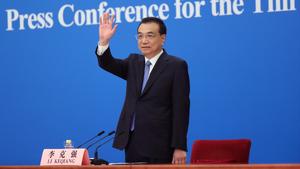 Premier Li Keqiang waves to reporters before he takes questions at a news conference via video link in Beijing on May 28, 2020. (PHOTO / XINHUA)
Premier Li Keqiang waves to reporters before he takes questions at a news conference via video link in Beijing on May 28, 2020. (PHOTO / XINHUA)
1. International cooperation on COVID-19 pandemic
China is open to international cooperation on the research and development of vaccines, effective drugs and testing agents for COVID-19 and is willing to share those products with the world.
China, like many other countries, believes there should be scientific efforts to research the origin of the novel coronavirus, which will help to contain the pandemic and protect the lives and health of people around the world.
The Chinese people have brought the outbreak under control through painstaking efforts, and are sharing pandemic-related information with the international community in an open, transparent and responsible manner.
China will continue to deal with any outbreak promptly and control the contagion in a scientific manner, and no cover-up will be allowed.
The international community is facing dual tasks, both controlling the pandemic and resuming economic activities, and there is a conflict of interests between the two goals.
ALSO READ: China calls for more debt relief for developing countries
Countries should strike a balance between the goals and the international community must come together to eventually get through the impact of the pandemic.
2. Regional ties
The commitment made last year by leaders of 15 countries at the leaders' meetings on East Asian cooperation on signing the Regional Comprehensive Economic Partnership by the end of this year will happen as scheduled.
China, Japan and the Republic of Korea are also working closely together to advance their free trade agreement talks. The three countries are close neighbors, and China would like to work with the other two countries.
READ MORE: China-Japan-ROK cooperation embraces new opportunities
Recently, China and the ROK opened a fast-track lane service for personnel and exchanges in the areas of commerce and technology.
China maintains an open attitude toward joining the Comprehensive and Progressive Agreement for Trans-Pacific Partnership.
3. Fiscal policy
The newly increased fiscal deficit and funds raised from special treasury bonds for COVID-19 control will be transferred to local governments. A special transfer payment mechanism will be established to ensure smaller businesses benefit from these funds.
China will also expand effective investment. An increase of 1.6 trillion yuan (US$223.6 billion) in local government special purpose bonds, together with the issuance of special treasury bonds for COVID-19 control this year, will support investment in new infrastructure facilities, new types of urbanization, and key projects that contribute to improving people's lives.
4. Poverty alleviation
The central government is determined to prioritize the work of meeting people's essential needs and achieving the country's target in poverty alleviation this year.
China now faces a daunting task in eliminating absolute poverty. Before COVID-19 struck, there were about 5 million people living below the official poverty line. Because of the disease, some have fallen back into poverty.
China is a large developing country with a very big population. Though the average annual per capita income is 30,000 yuan (US$4,193), some 600 million people earn less than 1,000 yuan a month, which is not even enough to rent a room in medium-sized cities. Because of the COVID-19 outbreak, many families have encountered difficulties.
It is a very high priority on the government work agenda to meet people's essential needs, including vulnerable groups and families who have encountered new difficulties because of the outbreak.
READ MORE: Poverty-alleviation goal achievable despite outbreak
This year we are determined to end poverty as scheduled. This is a solid commitment to the whole of Chinese society made by the Communist Party of China Central Committee with Comrade Xi Jinping at its core.
5. Social security funds
Governments at all levels always put people's interests first.
The central government has decided to expand the coverage of subsistence allowances and unemployment benefits. Some 60 million people in China still live on a subsistence allowance or receive unemployment benefits or other support.
This year, the number of beneficiaries will rise and the government is prepared to introduce strong measures to support these vulnerable groups.
Some 300 million Chinese senior citizens live on a pension, and for them the central government has decided to raise pensions for retirees.
China has a sufficient balance in the social security funds to ensure that pension benefits will be paid on time, which will give more hope to people about the future.
The authorities must ensure that benefits and support are provided to the respective groups. That will help to reassure people about basic living allowance and help promote economic development.


